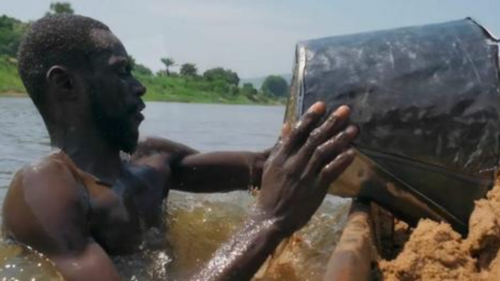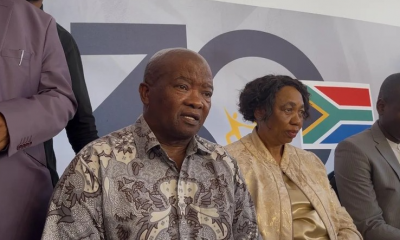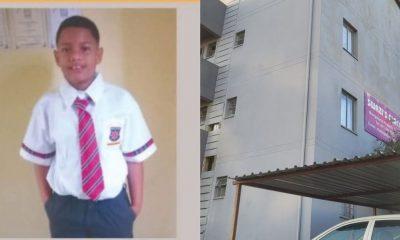News
Top 10 African Films at Encounters Documentary Festival

The Encounters South African International Documentary Festival, marking its 25th season this year, will return to selected theatres in Cape Town and Johannesburg from 22 June to 2 July. Recognised as the continent’s largest and most significant platform for documentary films, Encounters continues to shed light on pressing African issues onscreen while paving the way for future solutions. The Africa Report has explored this year’s curated program in-depth and highlights 10 exceptional documentaries that epitomise the festival’s excellence as reported by All Africa Report.
Also Read: Flight Chaos and Luggage Woes Amid Storms and FAA Staffing Issues
!Aitsa (South Africa/Denmark)
!Aitsa delves into the vast desert region of South Africa known as the Karoo, home to the Square Kilometer Array (SKA) science project. This ambitious venture, comprising massive satellite dishes the size of three-storey buildings, aims to explore dark matter and the universe’s origins. Director Dane Dodd’s experimental creation masterfully combines the excitement of cutting-edge science with the profound spiritual wisdom of the indigenous population. The film daringly suggests that embracing both spectrums could accelerate human enlightenment.
Calvinia (South Africa/Switzerland)
Rudi van der Merwe’s Calvinia takes a surprising and familiar approach to the sub-genre of documentaries focused on returning home. The film draws inspiration from the small South African town where Van der Merwe grew up, weaving together lyrical personal essays using family vignettes, social media chats, and the weight of memories and ghosts from the past. Despite some progress, the town seems trapped in a time warp, evoking a sense of nostalgic reflection.
Also Read: Gauteng Grappling With Cholera Outbreak After Sewerage Burst
1001 Days (South Africa/UK)
In Alexandra, a township in Johannesburg, two-thirds of women are survivors of sexual or domestic abuse. 1001 Days offer an intimate and profoundly feminist perspective on community intervention. Directors Kethiwe Ngcobo and Chloe White follow a trio of empathetic community health workers, some of whom are survivors, as they provide vital support to new mothers during the first 1001 days of their baby’s lives. This heartwarming documentary showcases the power of collective action and compassion.
A Story of Bones (UK)
A Story of Bones, directed by Joseph Curran and Dominic de Vere, unveils one woman’s relentless battle for justice against the entire machinery of the British government. Annina van Neel, a Namibian environmental officer working on the airport project for the remote island of Saint Helena, uncovers an unmarked mass burial ground holding the remains of approximately 9,000 formerly enslaved Africans. Driven by the haunting legacy of historical injustice, she embarks on a protracted fight for their proper memorialisation.
Bobi Wine: The People’s President (Uganda/UK/US)
Bobi Wine: The People’s President, directed by Christopher Sharp and Moses Bwayo, offers an intriguing glimpse into a democracy under threat. The film chronicles the journey of Ugandan pop star-turned-lawmaker Bobi Wine (Robert Kyagulanyi Ssentamu) as he challenges President Yoweri Museveni for the highest office in the country. Wine’s charisma and determination shine through as he rises from the slums to international prominence, while the documentary sheds light on the heavy personal sacrifices he continues to endure.
Also Read: Bassonia’s Medellin Gentlemen Groomers Celebrate Dads on Father’s Day
Eat Bitter (CAR/China)
Eat Bitter provides a sharply observant, character-driven account of two individuals striving for a legitimate livelihood in one of the world’s poorest regions. Despite the spectre of war hovering nearby, Bangui in the Central African Republic undergoes rapid construction and attracts Chinese migrants seeking business opportunities. Directors Pascale Appora-Gnekindy and Ningyi Sun skillfully depict the lives of a Central African and a Chinese immigrant, each pursuing different paths to contribute to the nation’s development.
Le Spectre de Boko Haram (The Ghost of Boko Haram) (Cameroon/France)
Le Spectre de Boko Haram delivers an affecting and visually striking portrayal of the impact of the terrorist group Boko Haram through the eyes of child victims. Director Cyrielle Raingou, the winner of the top prize at the Rotterdam film festival, follows three children in a border town in Cameroon’s northern region as they navigate the perils of armed conflict while coming of age. The film acknowledges the contrasting aspects of conflicts while celebrating the resilience and humanity of the survivors.
Milisuthando (South Africa/Colombia)
Milisuthando, written and directed by South African filmmaker Milisuthando Bongela, opens the festival with its inventive and captivating narrative. Presented in five unique chapters, the film explores multiple ideas while maintaining a coherent core. Bongela shares her personal experiences growing up in the Transkei, a rural and segregated region established during apartheid, as an experiment in promoting independence for the black population. Milisuthando encapsulates the complexities of identity and heritage with remarkable creativity.
Also Read: City of Joburg Official Sentenced for Corruption in Brixton Magistrate’s Court
Money, Freedom, A Story of CFA Franc (Senegal/France/Belgium/Germany)
Katy Léna N’diaye’s Money, Freedom, A Story of CFA Franc offers a thought-provoking examination of the currency’s legacy in francophone Africa. N’diaye delves into the history of the CFA Franc, tracing its roots in the sins of the past and exploring the consequences of its continued relevance today. Combining historical texts, archival footage, and museum artefacts, the documentary incorporates insights from significant players in regional monetary and fiscal policy, culminating in a call to action.
We, Students! (CAR/DRC/France)
Director Rafiki Fariala captures the lives of his friends while studying at the University of Bangui in the Central African Republic in We, Students! The film serves as both a celebration of youth and a critique of the country’s flawed education system. Despite scathing depictions of the abysmal living conditions on campus, the documentary showcases the students’ resilience and sheds light on how individuals become products of a flawed system.
The Encounters South African International Documentary Festival returns with a remarkable lineup of thought-provoking films that tackle diverse topics and showcase exceptional storytelling. These 10 documentaries, among others, provide a unique and insightful perspective on pressing issues within Africa and beyond, offering audiences an opportunity to engage with the power of documentary filmmaking.
Also Read:
Follow us on Google News
Photo: Facebook / @The Africa Report






















